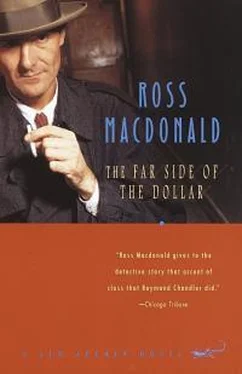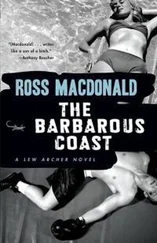“He rented that store for a long time. But he couldn’t quite make a go of it. There’s too many photographers in this town. He held on for seven or eight years after the war and then gave up on it.”
“You don’t know where he is now?”
“No sir, I do not.”
The sizzling of my steak reached a certain intensity, and he heard it. He went and flipped it with his spatula and came back to me. “You want french frieds?”
“All right. What’s the last you saw of Harley?”
“The last I heard of him he moved out to the Valley. That was a good ten years ago. He was trying to run his business out of the front room of his house in Van Nuys. He’s a pretty good photographer – he took a fine picture of my boy’s christening party – but he’s got no head for business. I ought to know, he still owes me three months’ rent.”
Six young people came in and lined up along the counter. They had wind in their hair, sand in their ears, and the word “Surfbirds” stenciled across the backs of their identical yellow sweatshirts. All of them, girls and boys, ordered two hamburgers apiece.
One of the boys put a quarter in the jukebox and played “Surfin’ ain’t no sin.”
Mr. Vernon got twelve hamburger patties out of the refrigerator and lined them up on the grill. He put my steak on a plate with a handful of fried potatoes and brought it to me personally.
“I could look up that Van Nuys address if it’s important. I kept it on account of the rent he owed me.”
“It’s important.”
I showed him Carol’s picture, the young one Harley had taken. “Do you recognize his wife?”
“I didn’t even know he had a wife. I didn’t think he’d rate a girl like that.”
“Why not?”
“He’s no ladies’ man. He never was. Harold’s the quiet type.”
Doubt was slipping in again that I was on the right track. It made my head ache. “Can you describe him to me?”
“He’s just an ordinary-looking fellow, about my size, five foot ten. Kind of a long nose. Blue eyes. Sandy hair. There’s nothing special about him. Of course he’d be older now.”
“How old?”
“Fifty at least. I’m fifty-nine myself, due to retire next year. Excuse me, mister.”
He flipped the twelve hamburger patties over, distributed twelve half-buns on top of them and went out through a swinging door at the back. I ate my steak. Mr. Vernon returned with a slip of paper on which he had written Harley’s Van Nuys address: 956 Elmhurst.
The waitress delivered the hamburgers to the surfbirds. They munched them in time to the music. The song the jukebox was playing as I went out had a refrain about “the day that I caught the big wave and made you my slave.”
I drove up Sunset onto the San Diego Freeway headed north.
Elmhurst was a working-class street of prewar bungalows built too close together. It was a warm night in the Valley, and some people were still out on their porches and lawns. A fat man drinking beer on the porch of 956 told me that Harley had sold him the house in 1960. He had his present address because he was still paying Harley monthly installments on a second trust deed.
That didn’t sound like the Harley I knew. I asked him for a description.
“He’s kind of a sad character,” the fat man said. “One of these guys that wouldn’t say ‘boo’ to a goose. He’s had his troubles, I guess.”
“What kind of troubles?”
“Search me. I don’t know him well. I only saw him the twice when I bought the house from him. He wanted out in a hurry, and he gave me a good buy. He had this chance for a job in Long Beach, developing film, and he didn’t want to commute.”
He gave me Harley’s address in Long Beach, which is a long way from Van Nuys. It was close to midnight when I found the house, a tract house near Long Beach Boulevard. It had brown weeds in the front yard, and was lightless, like most of the houses in the street.
I drove past a street light to the end of the block and walked back. The all-night traffic on the boulevard filled the air with a kind of excitement, rough and forlorn. I was raised in Long Beach, and I used to cruise its boulevards in a model-A Ford. Their sound, whining, threatening, rising, fading, spoke to something deep in my mind which I loved and hated. I didn’t want to knock on Harley’s door. I was almost certain I had the wrong man.
The overhead door of the attached garage was closed but not locked. I opened it quietly. The street light down the block shone on the rear of a dirty white Ford sedan with an Idaho license plate.
I went to the left-hand door of the car and opened it. The dome light came on. The car was registered in the name of Robert Brown with an address in Pocatello. My heart was pounding so hard I could scarcely breathe.
The door from the garage into the house was suddenly outlined up light. The door sprung open. The light slapped me across the eyes and drenched me.
“Mike?” said the voice of a man I didn’t know. He looked around the corner of the door frame. “Is that you, Mike?”
“I saw Mike yesterday.”
“Who are you?”
“A friend.” I didn’t say whose friend. “He left his car for you, I see.”
“That’s between him and I” His defensive tone encouraged me. I moved across the lighted space between us and stepped up into his kitchen, closing the door behind me. He didn’t try to keep me out. He stood barefoot in his pajamas facing me, gray-haired and haggard-faced, with drooping hound eyes.
“My brother didn’t tell me about a partner.”
“Oh? What did he tell you?”
“Nothing. I mean–” He tried to bite his lower lip. His teeth were false, and slipped. Until he sucked them back into place he looked as if I had scared him literally to death. “He didn’t tell me a thing about you or anything. I don’t know why you come to me. That car is mine. I traded him my crate for it.”
“Was that wise?”
“I dunno, maybe not.”
He glanced at the unwashed dishes piled in the sink as if they shared responsibility for his lack of wisdom. “Anyway, it’s none of your business.”
“It’s everybody’s business, Harold. You must know that by now.”
His lips formed the word “Yes” without quite saying it. Tears came into his eyes. It was Harold he mourned for. He named the most terrible fear he could conjure up: “Are you from the FBI?”
“I’m a police agent. We need to have a talk.”
“Here?”
“This is as good a place as any.”
He looked around the dingy little room as if he was seeing it with new eyes. We sat on opposite sides of the kitchen table. The checkered oilcloth that covered it was threadbare in places.
“I didn’t want any part of this,” he said.
“Who would?”
“And it isn’t the first time he got me into trouble, not by a long shot. This has been going on for the last thirty-five years, ever since Mike got old enough to walk and talk. I kid you not.”
“Just what do you mean when you say he’s got you into trouble? This time.”
He shrugged crookedly and raised his open hands as if I should plainly be able to see the stigmata in his palms. “He’s mixed up in a kidnapping, isn’t he?”
“Did he tell you that?”
“He never told me anything straight in his life. But I can read. Since I saw the papers today I’ve been scared to go out of the house. And you know what my wife did? She left me. She took a taxi to the bus station and went back to her mother in Oxnard. She didn’t even wash last night’s dishes.”
“When was your brother here?”
“Last night. He got here around ten-thirty. We were on our way to bed but I got up again. I talked to him right here where we’re sitting. I thought there was something screwy going on. He had that wild look in his eye – but I didn’t know what. He gave me one of his stories, that he won a lot of money in a poker game from some sailors in Dago, and they were after him to take the money back. That’s why he wanted to change cars with me. He said.”
Читать дальше












